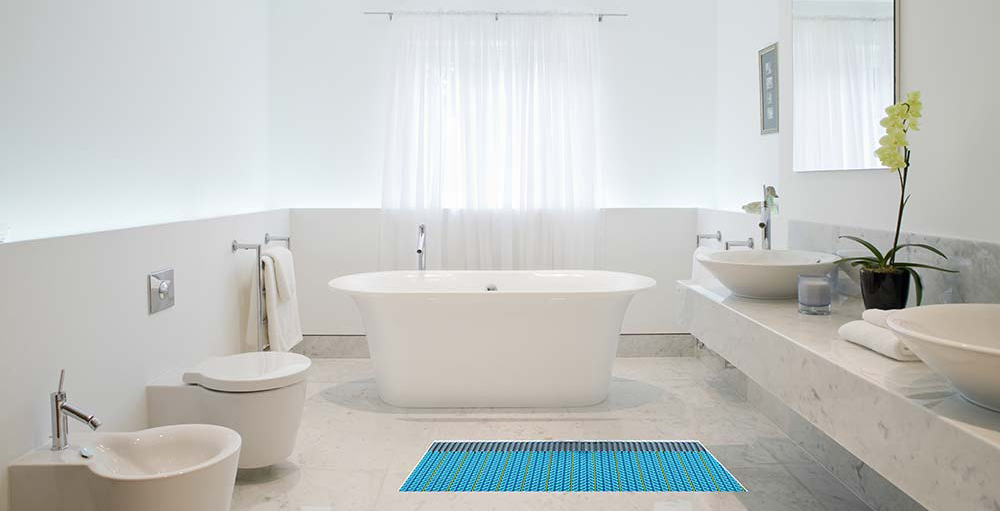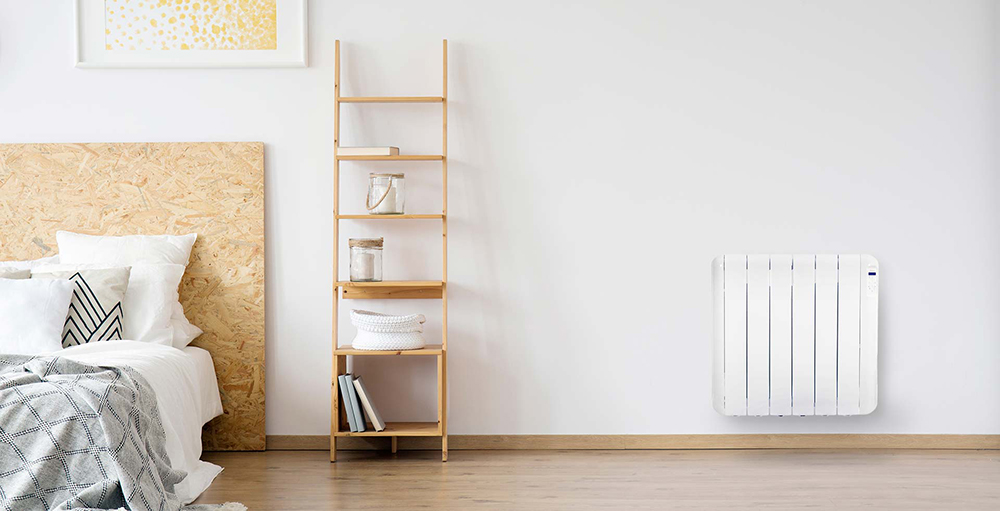Underfloor heating (UFH) tends to be the heating option of choice for many self-builders and renovators. It is as much about the comfort and efficiency as it is about the extra wall space it gives. Radiators on the other hand, are cheaper than underfloor heating to install if you are simply replacing like for like and choice is as much about aesthetics as it is about the amount of heat needed.
Underfloor Heating
Underfloor heating offers an effective and efficient heating solution that is out of sight and makes no demands on wall space. It works by turning the entire floor area into a heating source either via warm water pipes (wet underfloor heating) or electric mats (or cables) concealed within the floor build-up. The resulting gentle heat rises steadily upwards, and there are no cold spots or draughts, making for a very comfortable environment.
Advantages
- It distributes an even heat throughout the room/space, meaning no cold spots.
- Underfloor heating frees up wall space, giving greater flexibility to room design and layout.
- You can create heating zones so that each room in the home can have a different temperature controlled by its own thermostat. This means that energy is only used to heat the room you want it to, when you need it.
- In particular, electric underfloor heating operates at lower temperatures and is easily controlled making it more energy-efficient. Oh, and don’t forget that electric underfloor heating is quick to heat up!
- If you choose electric underfloor heating your home will create less carbon emissions than traditional central heating. This is because the percentage of green energy sources such as wind farms has increased.
Things to be aware of:
- A wet underfloor heating system takes longer to reach the desired temperature compared with electric underfloor heating.
- Water based systems cost a lot more to install because you need to allow for the floor construction build up and screed layers. A qualified plumber will have to install the system and connect it with your boiler.
- Electric underfloor heating systems need a qualified electrician to connect the system.
- Which underfloor heating system is right for you?
There are lots of different types of underfloor heating and the system you choose will depend on the project you have. Wet underfloor heating is more frequently used in new build projects where the ‘pipework’ is installed in a much thicker layer of screed. Electric underfloor heating is ideal for both renovations and new builds as it has minimal impact on the height of the floor.
When it comes to electric underfloor heating, which type you install relies heavily on the type of floor covering you are going to lay over it. There’s Mesh, Membrane, Foil and in screed cable. If you are looking to install electric underfloor heating under a tile or stone finish, then either Mesh or Membrane would be ideal. If you choose a wood, carpet or vinyl floor finish, then Foil is the perfect choice.
Radiators
Radiators are designed to heat the air in the room using convection to transfer heat from the radiator to the surrounding air. They do this by drawing cool air in at the bottom, warming the air as it passes over the radiator fins, and discharging the heated air at the top. By far the biggest advantage of a radiator is that they are quick to warm up and easy to control.
Advantages
- Radiators are quick to respond to desired changes in temperature.
- They are cheaper to install but only if you are replacing like for like or installing an electric radiator which can be simply plugged in to an existing socket.
- Radiators are comparatively less disruptive to install in existing homes when compared to underfloor heating. However this is only if you are not including additional sealed pipework for existing central heating systems.
Things to be aware of:
- Radiators do not distribute an even heat throughout the room and can result in cool spots.
- They are less efficient. Especially using a traditional central heating system when you have a single thermostat to control the temperature throughout he home.
- They take up valuable wall space, which reduces design freedom…even more so in smaller spaces.
What radiator will you choose?
Just like underfloor heating, there are a range of options when it comes to choosing the right radiator for your home. You can go for the stylish and sleek glass flat panel heater which comes with sleek aluminium feet so you can either use it as a free-standing heater or install it permanently on any wall using the built in brackets and fixing screws. Alternatively, you can go for a convector panel heater with its intuitive control panel with LCD display making it is easy to navigate through the heating modes to customise your heating experience. Finally there's the oil filled electric radiator with built-in energy monitor. It comes with everything you need in one box, including a handy wall fixing template! Its accurate, fast acting control reduces temperature overrun and maximises energy efficiency.
Can radiators and underfloor heating work together?
Yes, you can run your traditional central heating system and wet underfloor heating systems on one boiler using a two-port valve but it’s important you check with your boiler manufacturer. Combining underfloor heating and traditional central heating also allows you to create zones in your home, where one part gets heated via the radiators and others warm up with underfloor heating.
Of course, things like insulation can affect the heating of your home as well. So, when you are thinking of installing a new system, make sure you know the alternatives that are available to you and which one will best suit your project.
What is best? Underfloor heating or radiators?
| T | 0800 019 5899 |
|---|---|
| F | 08700 412140 |
| E | sales@thermosphere.com |
| W | Visit ThermoSphere's website |
| Bridge House, Pattenden Lane, Marden, Kent, TN12 9QJ |
Products by this Company







